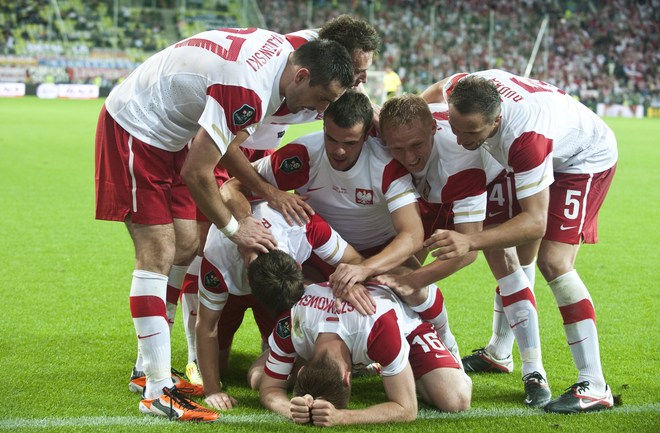With the Polish venues on track in their preparations for co-hosting Euro 2012, the lingering concern for the country’s football fans is whether they will have a national team capable of putting up a respectable performance.
Coach Franciszek Smuda has seen his side fall as far as 73rd in FIFA’s admittedly farcical ranking system, with the dearth of playing talent a regular topic for the country’s footballing media. Many wonder what happened to the squad that won the European Under-18 Championship in Finland in 2001.
That team included Tomasz Kuszczak, Sebastian Mila and Paweł Brożek, all of whom have gone on to play for the senior side, but also featured ten players who have failed to get cap between them; the “Lost Generation”, as the magazine Piłka nożna labels them.
The problem facing Polish football is no starker than in the case of last year’s champions Wisła Kraków. They were comfortably the best team last season, winning the Ekstraklasa title by seven points. Their line-up, though, rarely features more than a couple of Poles and has representatives of 11 other nations within the squad.
The club remain nationally renowned for the paucity of their youth training facilities but have shown that smart recruitment can override the need for youth development (they’ve won seven Ekstraklasa titles since 2000). The club’s Dutch coach, Robert Maaskant, has claimed that Wisła simply cannot afford to buy good young Polish players, but this fails to explain why the club insist on investing so little on producing players themselves.
“The truth is that the changes that have happened in the last 20 years in Poland have placed much pressure on youth training,” admitted Piotr Waśniewski, president of last year’s runners-up, Śląsk Wrocław. “Most of the clubs were owned by the military, police, governments or companies. And after that, when the private money came in, every owner faced the hard question: spend money on professional players or spend it on youth? There was always only one [answer] – I will spend the money on the professionals because I need results in a very short time. So most of the structures broke down. And right now, we can see the results.”
Waśniewski has the same issue as all club presidents: in the short-termist world of professional sport, the scale of improvements required in youth training mean that solutions can only come in the long term. Meanwhile, Poland’s prosperity relative to a number of other countries in central and eastern Europe has enhanced its football clubs’ ability to recruit from elsewhere in the region, resulting in a general bias throughout the league for recruitment over development.
The Polish Football Association (PZPN) has new regulations that require teams to field a minimum number of domestic players (a ploy that has been criticised by many for forcing up the price of local talent), as well as investing in the Młoda Ekstraklasa – a league conceived to give formal competition for youth players from the country’s top-flight clubs. However, given the PZPN’s propensity for getting bogged down in internal politicking and bureaucracy, progress seems likely to be slow. The 2012 European Championship is helping to accelerate improvements in Polish infrastructure but, with clubs still hesitant about the value of youth development, the tournament’s legacy for football may remain confined to the steel and concrete of the stadiums.
